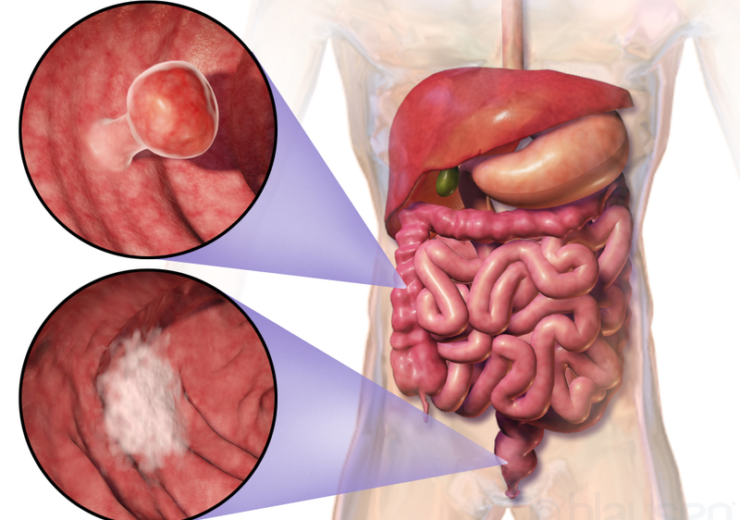The regulatory approval is based on the Phase 3 BEACON CRC trial, which showed positive results for BRAFTOVI plus cetuximab to treat mCRC

EC approves Pierre Fabre’s BRAFTOVI plus Cetuximab for bowel cancer (Credit: Blausen Medical Communications, Inc./Wikipedia.)
French pharmaceutical and cosmetics firm Pierre Fabre has received European Commission (EC) approval for BRAFTOVI (encorafenib) in combination with cetuximab (marketed as Erbitux) to treat a type of bowel cancer.
The EC approval indicated BRAFTOVI plus cetuximab for adult patients with BRAFV600E-mutant metastatic colorectal cancer (mCRC) who have received prior systemic therapy.
Pierre Fabre medical care business unit CEO Jean-Luc Lowinski said: “We are extremely pleased that patients will now have access, for the very first time, to a targeted therapy specifically for BRAFV600E-mutant mCRC.
“Today’s approval is a testament to our long-term commitment to advancing care for patients living with difficult-to-treat cancers and to delivering precision medicine. We will now work tirelessly to bring this new treatment option to patients in Europe, as quickly as possible.”
EC approval is based on data from the Phase 3 BEACON CRC trial of BRAFTOVI plus Cetuximab
Pierre Fabre said that the EC approval is supported by data from the Phase 3 BEACON CRC trial, and the approval is applicable to all 27 EU member states along with Iceland, Liechtenstein, Norway and the UK.
In addition, the regulatory approval has been granted following the receipt of a positive opinion from the European Medicines Agency (EMA) Committee for Medicinal Products for Human Use (CHMP) in April 2020, based on results from the Phase 3 BEACON CRC trial.
BEACON CRC trial marks the first and only randomised Phase 3 study designed to test a BRAF combination targeted therapy in BRAFV600E-mutant mCRC, said the company.
In the study, BRAFTOVI plus cetuximab combination has improved overall survival (OS) in patients and reduced the risk of death compared to cetuximab plus irinotecan-containing regimen (control).
In addition, the study data also demonstrated an improved objective response rate (ORR) with the control arm, and BRAFTOVI plus cetuximab showed a well-tolerated safety profile with no unexpected toxicities.
The most common adverse reactions include fatigue, nausea, diarrhoea, dermatitis acneiform, abdominal pain, arthralgia/musculoskeletal pain, decreased appetite, rash and vomiting.
BEACON CRC trial lead investigator Josep Tabernero said: “This approval is truly great news and much needed for patients with BRAFV600E-mutant mCRC and for physicians treating this devastating cancer, as until now, there has been no EC-approved therapies specifically indicated for this high-medical-need population.
“The new encorafenib and cetuximab combination regimen will now change the way we treat these patients, with the possibility of delaying disease progression and prolonging their lives.”
